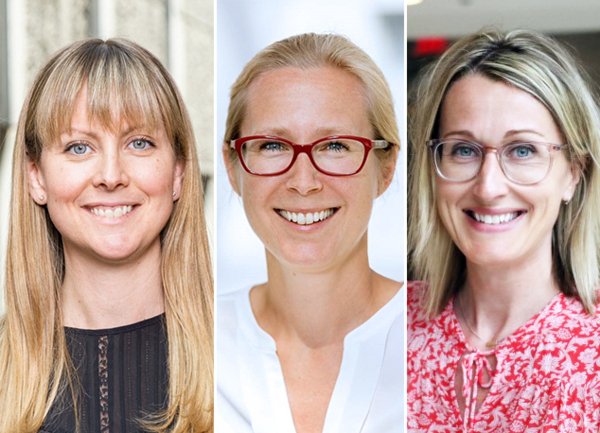They are awarded the ERC Starting Grant

Three researchers at Karolinska Institutet have been awarded the ERC Starting Grant 2019: Jenny Mjösberg, Maria Genander, and newly recruited Pia Dosenovic. Their projects concern inflammatory bowel disease, esophageal cancers, and HIV vaccine, respectively. In all, the ERC will support 408 early-career researchers from around the world with its prestigious starting grant this year.
The European Research Council Starting Grant (ERC StG) aims at supporting up-and-coming research leaders, who are building their research teams and are on their way to establish their own line of research. The researchers included in the programme are awarded up to EUR 1.5 million over a five-year period. In total, the ERC in this year’s call will invest EUR 621 million in young research leaders. About 13 percent of the applications were approved. Here are the awarded projects at KI:
Principal investigator: Jenny Mjösberg, Department of Medicine, Huddinge
Project: Single-cell analysis of intestinal lymphocytes reveals targets for treatment of inflammatory bowel disease (GUT-SEQ)
Summary: Inflammatory bowel disease (IBD) constitutes an increasing global health burden. Hampering rationale treatment strategies, the human immune system in different intestinal compartments remains largely unexplored. In the project now being funded by the ERC, Jenny Mjösberg will use state-of-the-art technology to advance our understanding of the complex intestinal lymphocyte network in IBD. In previous studies, Jenny Mjösberg and her group have made important discoveries of a type of lymphocyte in the innate immune system: innate lymphoid cells (ILCs), revealing that in addition to adaptive lymphocytes, so called T cells, innate equivalents contribute to mucosal immunity. The researchers have access to unique patient samples as well as established methods for gene- and protein-expression analysis on the single-cell level. With this approach, they now hope to unveil previously unknown immune cell subtypes and gene expression profiles in different tissue compartments of the human inflamed and non-inflamed intestine. Building on this unprecedented molecular characterization, the researchers will perform longitudinal assessments of intestinal lymphocytes from IBD patients treated with novel biologicals. This approach provides an opportunity to unveil immunological signatures of treatment response, disease mechanisms and novel therapy targets.
More about Jenny Mjösberg’s research
Principal investigator: Maria Genander, Department of Cell and Molecular Biology
Project: Redefining the esophageal stem cell niche – towards targeting of squamous cell carcinoma (TroyCAN)
Summary: Patients suffering from esophageal caners are commonly treated by a combination of chemotherapy and esophagectomy, a debilitating surgical procedure. In this project funded by ERC, Maria Genander and her colleagues build on previous studies in with they, for the first time, were able to show the heterogeneity within the esophageal stem cell population in the normal mouse esophagus. What they want to study now is how this heterogeneity is established and maintained by functionally characterizing distinct stem cell populations. By mapping how these stem cell populations interact with neighboring stromal cells in the healthy esophagus, they also hope to improve the understanding of how the interactions change during esophageal cancer. The goal is to systematically identify and impact alterations in tumor cells and their stromal niche to reduce tumor growth. Through increased understanding of how normal stem cells drive normal tissue maintenance and the processes that go wrong during tumor formation, scientists hope to be able to develop new therapeutic strategies that can reduce the need for surgical intervention.
More about Maria Genander’s research
Principal investigator: Pia Dosenovic, Department of Microbiology, Tumor and Cell Biology (starts her position at KI in December 2019)
Project: Vaccine development against variable pathogens (VIVA)
Summary: Vaccination is the most effective strategy to prevent infectious diseases. However, despite years of research there are currently no vaccines against genetically variable pathogens such as HIV-1. Contrary to what is required for non-variable pathogens, vaccines against variable pathogens must elicit antibodies specific for a limited number of conserved epitopes in order to be broadly protective. A vaccine must therefore recruit the right type of precursor cells from a pool of very diverse candidates that may recognize non-conserved regions. To develop such vaccines, it is important to understand antigen-driven B cell activation, differentiation and long-term survival in a polyclonal immune response where B cells with different specificities are activated simultaneously. With the ERC starting grant Pia Dosenovic will address this subject, using novel knock-in mice harbouring B cells that express human antibodies specific for conserved epitopes of the HIV-1 spike protein. Investigation of the immune responses that develop by these knock-in B cells in the context of a polyclonal immune repertoire will help researchers inform vaccine design against variable pathogens, while also increasing our basic understanding of how B cells work.
Facts about ERC StG 2019
- The researchers receiving the ERC StG are from 51 countries.
- 20 of the grantees will now move to European countries to conduct pioneering research.
- Most successful when it comes number of received grants are Germany, the UK, and the Netherlands.
- Of the Nordic countries, Sweden takes the lead.
